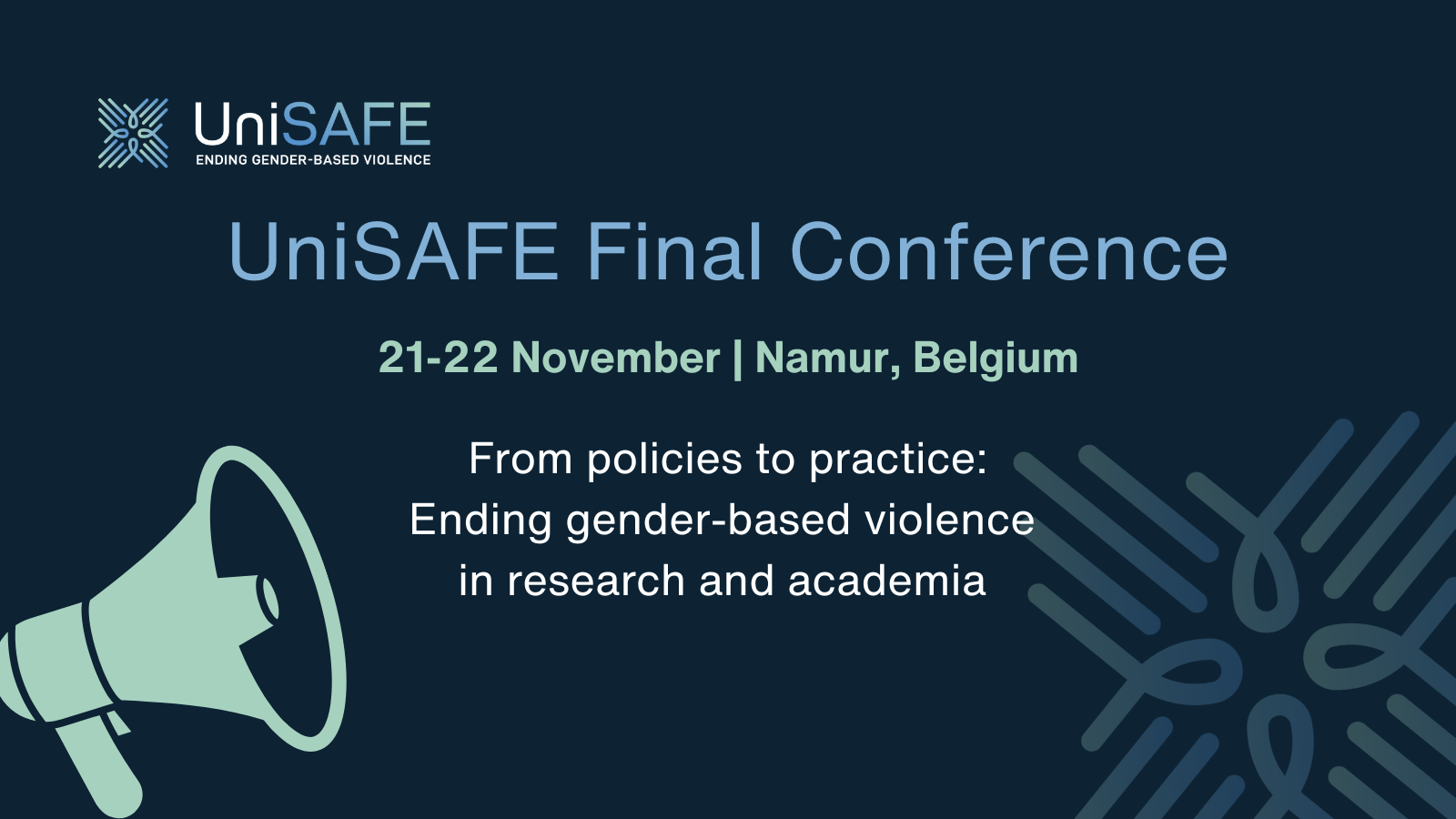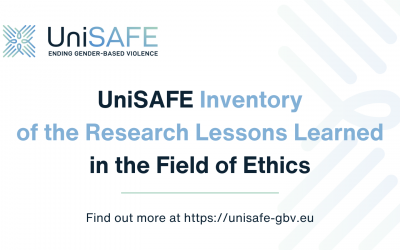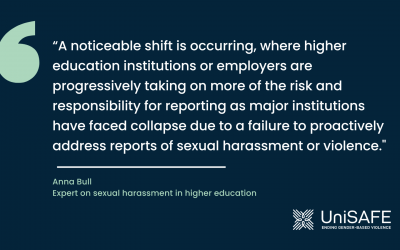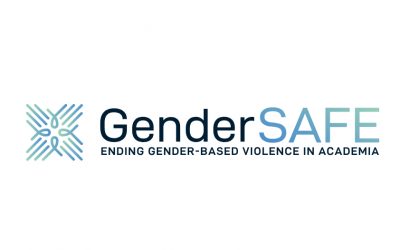From policy to practice:
Pathways to end gender-based violence
in academia and research
University of Namur, Belgium
Faculty of Law | 5 rempart de la Vierge – 5000 Namur
21 November | 12:30 – 18:00 | auditorium D11
22 November | 8:30 – 16:30 | auditorium D02
The UniSAFE project is delighted to announce its final event: From policy to practice: Pathways to end gender-based violence in academia and research.
Specifically addressing policymakers, decision-makers in university and research organisations, as well as gender equality officers, representatives from university networks and research funding organisations, the conference is open to all!
Gender-based violence is widespread. It takes on multiple forms, has long-lasting and devastating consequences and occurs in every sphere and domain of life, in every organisation, and in offline and online settings. Not only do higher education institutions and research organisations see no exception to this, but they are particularly prone to high levels of gender-based violence.
As universities and research organisations are slowly finding the courage to tackle this issue, they often lack guidance on where to start or how to ensure that their policies and measures are comprehensive enough to be efficient. Other decision-makers are still not aware enough of the change to be initiated at the level of institutions and of public authorities.
For the past three years, UniSAFE has been investigating the prevalence of gender-based violence in academia and research, as well as institutions’ responses. Its widescale survey – taken by 42,000 staff and students from 45 organisations in 15 countries – has provided solid and comparable data, which has been analysed and compared with results from interviews, policy mapping and case studies of institutional responses. This knowledge has been translated into concrete tools and recommendations.
Looking from a holistic perspective – using the 7P framework (prevalence, prevention, protection, prosecution, provision of services, partnerships, policies), this conference goes beyond results from the research and presents its applications for institutions, with practical recommendations tailored to various contexts: universities and research organisations, public authorities at EU and national levels. It will showcase the impact and sustainable benefits from using the UniSAFE toolkit created in the project for universities and research organisations to ensure safe, violence-free higher education and research environments.
The event will take place in person at the University of Namur, Faculty of Law (Address: 5 rempart de la Vierge – 5000 Namur), and will be streamed online.
Registration is free of charge but seats are limited!
Registrations for in-person attendance are now closed. However, we still have a few spots available; if you are interested, please contact us at finalevent[at]unisafe-gbv.eu, indicating the name of your organisation and the days you would like to attend.
Programme overview
Day 1: Setting the scene through policies
Moderation by Colette Schrodi and Panagiota Polykarpou
| 12:30 | Registration, with light snacks and coffee |
| 13:30 |
Opening of UniSAFE’s final conference Annick Castiaux, Rector of the University of Namur Ildi Ipolyi, UniSAFE coordinator |
| 14:00 |
Keynote speech: Ensuring safety and equity in academia and research: a matter of justice
Françoise Tulkens, former judge at the European Court on Human Rights |
| 14:30 |
UniSAFE’s conceptual framework and key impacts Sofia Strid, UniSAFE scientific coordinator |
| 14:50 |
Commitments addressing gender-based violence at international level This session will set the context of institutional policy-making at international level and showcase the global relevance of UniSAFE’s findings and outputs.
|
| 15:50 | Coffee break |
| 16:20 |
Policy frameworks at national level: Opportunities and limitations for institutional responses to gender-based violence.
Moderator: Marcela Linková, Institute of Sociology of the Czech Academy of Sciences Panelists:
|
| 17:30 | Open floor: interactions and engagement with audience |
| 18:00 | Walking Dinner |
Day 2: On to practice: concrete pathways for institutional change
Moderation by Colette Schrodi and Panagiota Polykarpou
| 08:30 |
Welcome coffee |
| 09:00 |
Evidence for driving action within institutions: insights from UniSAFE’s research This session will highlight some of the key results from the institutional policy mapping, case study analysis of institutional responses to gender-based violence, and the project’s multi-level analysis of its survey data. It will then present some of the recommendations for concrete action based on this research. Presenters:
|
| 09:45 |
More evidence driving action: collecting data with a survivor-centred approach Leveraging UniSAFE’s learnings from collecting quantitative and qualitative data through its large-scale survey and numerous interviews with researchers, as well as experience from a similar survey at national level, this session will look into data collections at national, organisational and individual levels, providing institutions with concrete recommendations on how to collect data related to gender-based violence with a survivor-centred perspective. Moderated by Anke Lipinsky, GESIS – Leibniz Institute for the Social Sciences Presenters:
|
| 10:30 | Coffee break |
| 11:00 |
Where to start? Improving, Implementing and Assessing institutional policies with the UniSAFE toolkit This session addresses top-level management and change agents of universities and research organisations, whether they are just starting to develop policies to address gender-based violence or have already made significant progress. The spotlight of the session is on the UniSAFE toolkit, with its key components including an Action plan to support institutions in implementing and improving their policy, a Guide for designing awareness-raising campaigns, and a Guide for developing a protocol addressing gender-based violence. Institutional representatives will openly share their ongoing challenges along with inspiring practices in an exchange that will cultivate a collaborative environment with practical tips and recommendations. Finally, participants will discover the project’s guide to creating awareness-raising campaigns on gender-based violence with examples of good practice. Moderator: Siobán O’Brien Green, Trinity College Dublin Presenters:
Panellists
|
| 13:00 | Lunch |
| 14:00 |
Poster presentation of sister projects’ outputs and awareness-raising campaigns in universities |
| 14:30 |
Mutual learning as a means to advance change among umbrella organisations This panel session explores the role and benefits that umbrella organisations can play in facilitating mutual learning and exchange of practices with members, and how this leads to effective development, implementation, and monitoring of institutional policies. Moderator: Matthias Girod, Euroscience Panellists
|
| 15:30 |
Pathways for change: steps ahead The conference will conclude with broader perspectives on pathways to achieve a safe European Research Area, including developments under way of the ERA Action 5 on inclusive gender equality implementation, as well as a Spanish initiative taken within the Spanish Presidency of the EU to develop a certification system on victim-centred protection, and advances in ending gender-based violence in Spain. As UniSAFE has singled out challenges faced by higher education institutions and research organisations which call for further policymaking, the steps ahead for institutional change will be outlined at all levels, from EU to national and institutional policy and decision-making. Speakers:
|
| 16:30 | End |
Poster exhibition
The event will have two poster exhibitions, showcasing inspiring awareness-raising campaigns on gender-based violence in the context of universities and research organisations, and promoting outputs from sister projects working towards gender equality. If you would like to bring a poster, we invite you to read the guidelines and to register to the event. For any questions related to the posters, please email at finalevent@unisafe-gbv.eu.
Practical Information
How to get to Namur, where to stay,.. Find all the practical details in our Info Package!
Participants coming by car may use the faculty’s car park by printing and placing this conference flyer on their windshield.




